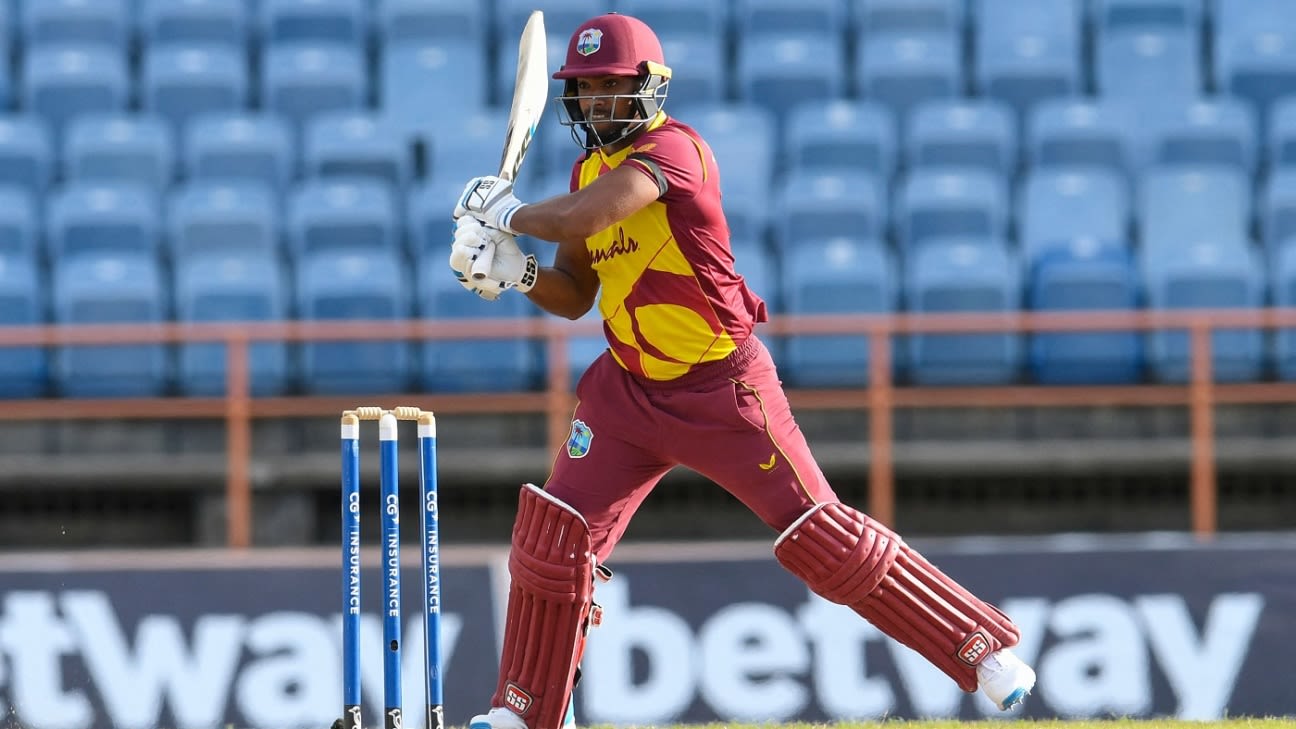West Indies captain Kieron Pollard has pleaded for patience to be shown towards the team's young batters as they try to build confidence ahead of the T20 World Cup. In the 3-2 series defeat to South Africa, the first of three five-match series West Indies are playing in the space of a couple of months, only Evin Lewis scored more than 100 runs as the batting order failed to fire collectively after starting with an eight-wicket win achieved with five overs to spare. Shimron Hetmyer and Nicholas Pooran, two of the most talented younger batters in the set-up, scored 128 runs in seven innings between them with the pair both struggling to go at much more than a run-a-ball. "When Hetmyer wasn't playing people were asking for his inclusion, now he's playing, he comes in and is trying to fulfil a role," Pollard told reporters ahead of the opening match against Australia in St Lucia. "He's a guy who is really, really talented, we have a lot of time for him. Let him play and see if we can reap the rewards of his talent. We are willing to work with him and he's willing to work. We just want him to succeed."
"There's a lot of conversations taking place but we still need to put it into practice. Some things might take longer, but that's the nature of life."
Kieron Pollard
Pooran, who also has the wicketkeeping gloves, slipped down to No. 7 in the last T20I against South Africa and briefly gave a glimpse of what he is capable of with consecutive sixes off Lungi Ngidi late in the chase. However, overall it has been a difficult year in the format for him which included four ducks in six innings at the IPL and in 13 T20I innings stretching back to December 2019 he has a top score of 26. "Nicholas Pooran, again, a young individual finding his craft, we know he's talented, and in any sportsman's career you will go through a period like this," Pollard said. "It is an opportunity for us to be there for these youngsters and give them this sort of hug and protect them then let them come out of it.
"As a team we are willing to work with these youngsters because we know in the future what they can do. Sometimes the easiest suggestion is to put them on the sidelines but is that going to help? Has it worked before?
"We are going to stick with these guys because we know deep down inside that these guys are talented and have what it takes to take West Indies cricket forward."
Away from concerns of the form of individual players, Pollard admitted that the batting line-up was struggling to find a balance to their tempo to ensure they don't lurch too severely between boundaries and dots balls.
In the series against South Africa, West Indies faced 233 dot balls in the five games compared to the visitors' 175 although were miles ahead in the sixes count 53-23.
"Yes, we've had a high percentage of dot balls throughout the series and the one prior to that," Pollard said. "It has been spoken about time and time again, I can assure you that we try not to leave any stone unturned. We have a wealth of experience and wealth of coaches who take time to go into details of where we need to improve as a team.
"There's a lot of conversations taking place but we still need to put it into practice. Some things might take longer, but that's the nature of life. It's like going into school, some persons need extra lessons to get it right."
"It can become a concern but is it a concern when you look around at the other teams and we hit more boundaries than them at different times. That's our strength, so it's two-fold."
Pollard also said it was difficult for players to work on specific skills during series where the matches come think and fast: the five games against Australia and South Africa take place over eight days.
"Before the series we might get open nets, we got some in Grenada which was fantastic, not something we've had over a period of time so we were able to work on our manoeuvring game, rotating the strike, in a couple of sessions - no boundaries, just looking to rotate the ball.
"When you play a series and have two games back-to-back you have one day's rest, then play another game, the toll that it takes on the body is going to very high. How much can you actually work on a practical perspective to get it right? With that being said, most of time we can have conversations, show the guys visuals of what to expect in those scenarios then when we do get the opportunity we try and work on it as much as possible. We can't work miracles overnight."
Andrew McGlashan is a deputy editor at ESPNcricinfo



 Phone: (800) 737. 6040
Phone: (800) 737. 6040 Fax: (800) 825 5558
Fax: (800) 825 5558 Website: www.idig.com
Website: www.idig.com Email: This email address is being protected from spambots. You need JavaScript enabled to view it.
Email: This email address is being protected from spambots. You need JavaScript enabled to view it.






